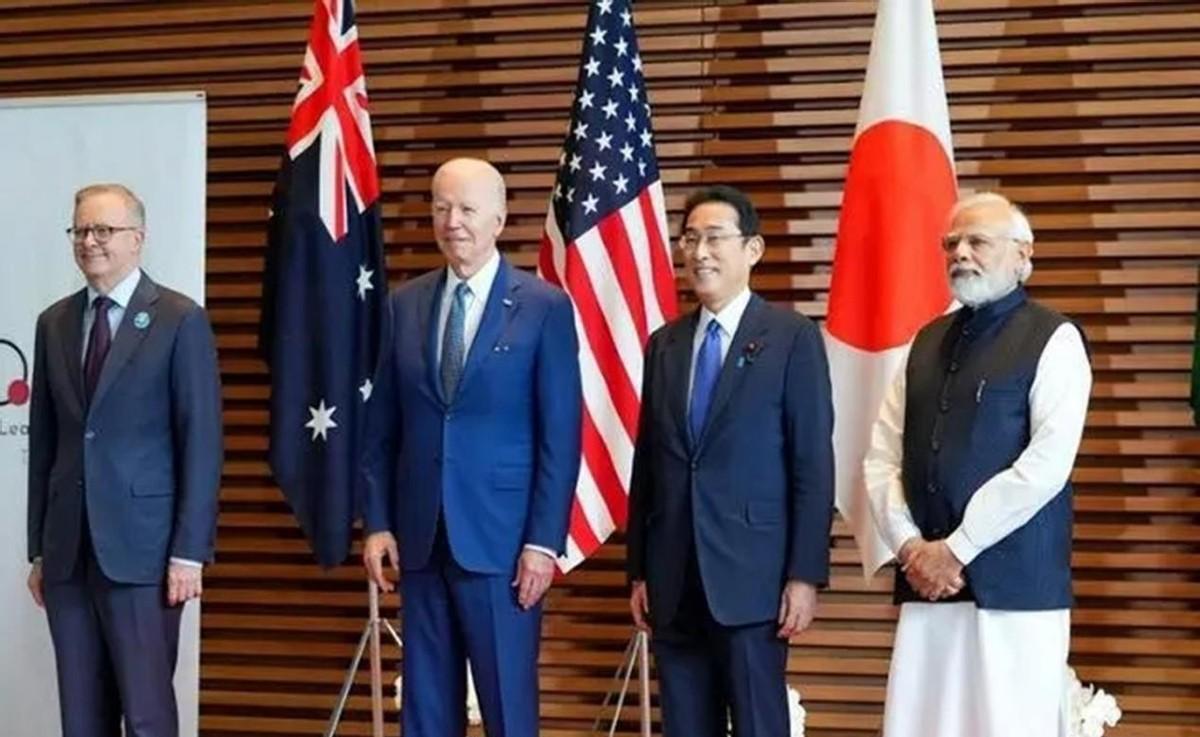During this time, Biden can be said to be proud, while busy giving speeches in Poland, navigating Europe, and not forgetting to visit Japan and South Korea, like a "martial arts alliance lord".
In Japan, Biden gave Kishida several gifts, including a pledge to "support Japan as a permanent member of the Security Council if the United Nations Security Council is reformed" and to support Japan's defense buildup. The most noteworthy thing is the Indo-Pacific economic framework painstakingly created by the United States, and 13 countries such as the United States, Japan, South Korea, India and Australia have joined this organization.
In Japan and South Korea, Biden did get a warm reception, but this does not mean that Biden can sit back and relax, and in some cases, Biden still touches a nose of ash.
On the 24th, the four-party talks between the United States, Japan, India and Australia were held as scheduled, including US President Biden, Japanese Prime Minister Fumio Kishida, Indian Prime Minister Modi, and Australian Prime Minister Albanes. During the meeting, Kishida said that Russia's "invasion" of Ukraine is a challenge to the UN Charter and must not allow similar things to happen in the Indo-Pacific region. Biden said that as long as Russia continues to fight, the United States will respond with partners.
Albanes, who has just won the Australian prime ministership, said it was necessary to join forces to address the biggest challenges in the field of security.

When the United States, Japan and Australia spoke out against Russia, Modi listened, with a very different attitude from the other three.
Obviously, in the matter of putting pressure on Russia, Modi did not give the United States face, and Modi refused to high-profile anti-Russia.
Whether it's insisting on importing Russian oil, circumventing the dollar to settle arms and energy trade with Russia, abstaining in a U.N. resolution condemning Russia at the United Nations General Assembly, or ridiculing "the United States and Europe buy Russian oil on a large scale, but not let India do it." During this time, India has not been less opposed to the United States, Europe, Japan and Australia.
In the face of the repeated persuasion of Macron, Scholz and Biden, Modi is still unmoved, which is indeed not easy. But this time, at the us-Japan-India-Australia quadripartite talks, in front of Biden, Kishida Fumio and Albanis, Modi actually "kept silent", which was somewhat unexpected.
Modi's biggest concern is the economic investment of the United States, Japan and Australia, especially the United States, and the Indian Foreign Ministry said that the United States is considering providing $4 billion in investment support to India.
Who is the biggest winner of the Russian-Ukrainian conflict? Many people first think of the United States, which is true, but in addition to the United States, there is another country that has gained a lot, that is, India. For India, which has repeatedly violated the White House, the United States can be said to dare to be angry but dare not sanction, because the United States has taken a fancy to india's market and labor force, and wants to borrow India's strength but constrains its opponents.
So there is such a situation: the economic investment of the United States, Europe and Japan, russia's weapons and energy, India can get it. In the long run, the EU's decoupling from Russia can be said to be confirmed, and Russia can almost only target India if it wants to find buyers who can import oil and gas on a large scale.
On the other hand, because the United States seeks to reorganize its supply chain and other reasons, India, with a large population, will inevitably become an investment target that the United States and Europe are competing for. The main reason why Modi is so emboldened is because he knows that the United States and Europe want to win India over, and even if the White House is angry, it will not wave the stick of sanctions against India.
Another thing that made Biden feel faceless was that the Japanese people took to the streets to hold anti-American demonstrations. Many protesters held banners and shouted slogans, dissatisfied with the Indo-Pacific economic framework proposed by the United States, the US-led quadrilateral dialogue mechanism, and the deepening alliance between the United States and Japan. In the eyes of these Japanese people, what the United States and Japan are doing may promote the escalation of the conflict and may even bring danger to Japan.
The Fact that the Japanese people do not save face for Biden means that There is no shortage of clear-eyed people in Japan, and many people know that the United States is not at ease, whether it is to loosen the shackles on Japan or help Japan seize the market, it is ultimately using Japan. If the situation changes and Japan is in danger, the United States is likely to treat Japan as it did Ukraine.
Again, the fox will eventually show its tail, the United States will not give Benefits to Japan, South Korea, India and Australia for no reason, and when the United States betrays its allies, Japan and Australia may suddenly wake up, and it turns out that Biden is really calculating.
As for how the United States will move next, it remains to be seen.